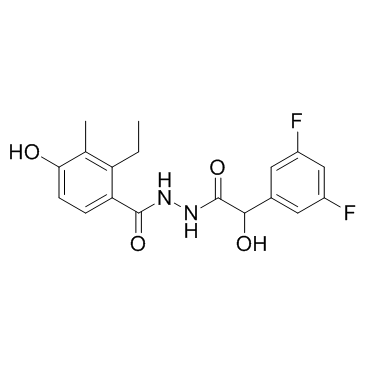| Description |
Salubrinal is a cell-permeable and selective inhibitor of eIF2α dephosphorylation.
|
| Related Catalog |
|
| Target |
IC50: 3 μM (SGK1)[1]
|
| In Vitro |
EMD638683 is a SGK1 inhibitor. EMD638683 inhibits the NDRG1 (N-Myc downstream-regulated gene 1) phosphorylation, an effect requiring 3.35±0.32 μM EMD638683 in the cell culture medium for half maximal effect (IC50). EMD638683 has also an inhibitory effect on cAMP-dependent protein kinase (PKA), mitogen- and stress-activated protein kinase 1 (MSK1), protein kinase C-related kinase 2 (PKR2), and the SGK isoforms SGK2 and SGK3[1]. In both, control and EMD638683 (50 µM)-treated CaCo-2 cells, radiation significantly increases the percentage of CaCo-2 cells undergoing late apoptosis. EMD638683 treatment alone tends to enhance the percentage of apoptotic CaCo-2 cells. Following radiation the percentage of apoptotic EMD638683-treated CaCo-2 cells is significantly higher than the percentage of apoptotic control cells. Thus, EMD638683 treatment significantly augments the apoptosis following radiation[2].
|
| In Vivo |
The colon is significantly longer and the colon weight significantly lower in EMD638683-treated mice than in placebo-treated mice, a finding pointing to an influence of EMD638683 on tumor growth following chemical carcinogenesis. In addition, the stomach weight is significantly lower in the EMD treated group. Most importantly, the number of developing tumors following carcinogenic treatment is significantly blunted by EMD638683 treatment[2]. EMD638683 (20 mg/kg, intragastrically) prevents progression of monocrotaline (MCT)-induced pulmonary vascular remodeling in rats. Hemodynamic characteristics show that EMD638683 treatment attenuates right ventricular systolic pressure (RVSP) (15.8±2.5 vs. 28.2±3.1 mmHg; P<0.05; n=6) and right ventricular hypertrophy index (RVHI) (0.27±0.02 vs. 0.41±0.06;P<0.05; n=6) compare to vehicle-dosed controls[3].
|
| Cell Assay |
Colon carcinoma (CaCo-2) cells are grown in complete DMEM medium containing 10% fetal calf serum, 1% sodium pyruvate, 1% penicillin-streptomycin and 1% non-essential amino acids under standard culture conditions (37°C, 5% CO2). 105 cells are seeded in 6 well plates and cultured with fresh culture medium for 24 h, after which EMD638683 (50 µM) is applied for 24 hours. For comparison, the cells are treated with the solvent (0.2 μL DMSO) and one solvent control is analysed with each set of experiments. The cells are subsequently exposed to 3.18 min radiation (3 Gray). After further incubation for 72 h in the presence or absence of EMD638683 (50 µM) the cells are analyzed utilizing flow cytometry[2].
|
| Animal Admin |
Rats and Mice[3] PAH is induced in 2-month-old male Sprague-Dawley rats by administering a single subcutaneous injection of MCT (60 mg/kg, n=12). Rats in the control group are given the vehicle saline (0.5 mL, subcutaneously, n=12). Six rats in each group are given EMD638683 (20 mg/kg) intragastrically once daily starting 2 days prior to MCT treatment. Rats are anesthetized with sodium pentobarbital (50 mg/kg intraperitoneally). Right ventricular systolic pressure (RVSP), right ventricular hypertrophy, and pulmonary vascular remodeling are evaluated 21 days after MCT injection. At the age of 10-12 weeks, male SGK1-/- mice and their wild-type (WT) littermates are given MCT in doses of 60 mg/100 g body weight once a week for 8 consecutive weeks by subcutaneous injection to induce PAH. There are eight mice per group. Mice are anesthetized with sodium pentobarbital (50 mg/kg intraperitoneally) on day 8 after the last MCT administration. Then RVSP, right ventricular hypertrophy, and pulmonary vascular remodeling are evaluated.
|
| References |
[1]. Ackermann TF, et al. EMD638683, a novel SGK inhibitor with antihypertensive potency. Cell Physiol Biochem. 2011;28(1):137-46. [2]. Towhid ST, et al. Inhibition of colonic tumor growth by the selective SGK inhibitor EMD638683. Cell Physiol Biochem. 2013;32(4):838-48. [3]. Xi X, et al. Serum-glucocorticoid regulated kinase 1 regulates macrophage recruitment and activation contributing to monocrotaline-induced pulmonary arterial hypertension. Cardiovasc Toxicol. 2014 Dec;14(4):368-78. [4]. Zhou H, et al. Inhibition of serum- and glucocorticoid-inducible kinase 1 enhances TLR-mediated inflammation and promotes endotoxin-driven organ failure. FASEB J. 2015 Sep;29(9):3737-49.
|
